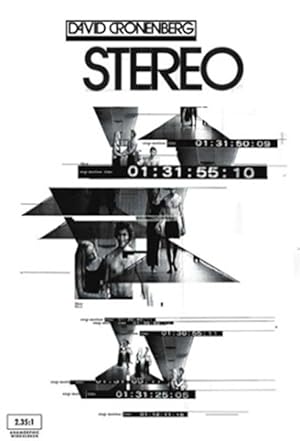
Stereo Page #4
- NOT RATED
- Year:
- 1969
- 65 min
- 338 Views
as a false self
diverting fellow telepathists
from the real or true self
which manifested itself only in occasional,
deliberately confused, verbal utterances.
She thus protected her true
self from telepathic intrusion
by abandoning her telepathic
faculty to a false self.
Not surprisingly, repeated telepathic
probes undertaken by other subjects
could not discover the true nature of
her experiential space continuum.
schizophonetic partition
as a telepathic intrusion avoidance device
is that the false telepathic self
tends to become increasingly parasitic
on the true oral/verbal self.
The true self begins to suffocate
in as much as it is starved
of contact with the outside.
And the false self gradually
becomes the only self
to interact with other selves.
In the instance of our
female schizophonetic subject
the true self began to express
its moribond existence
through the telepathic emission
vampirisim, disentegation and necrophilia.
Which sporadically interrupted the
functioning of the telepathic false self.
The intensity and frequency of this
emission of morbid, telepathic images
rapidly increased until it began to
create the same depressed mode
Another important function
of our experiment
was to be the practical testing
of the Stringfellow hypothesis.
The Stringfellow hypothesis takes
the form of the following equation:
The rate of telepathic flow
between two minds,
is directly proportional
to the intensity of the relationship
between the two minds.
The units used to measure flow and intensity
are taken from psycho-chemistry.
In less mathematical terms, we may say
that this hypothesis indicates that
even between mature telepathists
there can be no telepathic communication
until some sort of existential
emotional relationship
has been established in
conventional sensory ways.
Thus, among complete strangers
there would exist only a kind of noise,
a short wave static
The Stringfellow hypothesis
also suggests that here
the potency of human eroticism
would play an important role.
would be a substantial basis
for the establishing of a geometerically
increasing rate of telepathic flow.
The politics of experience
on the level of individuals
is a correlative of the
politics of social groups.
The politics of telepathic experience
may be studied as a projection of the
power struggles among individuals
into the extremities of psychic
potency and complexity,
a projection that is, into the
future of human social evolution.
Translation
Translate and read this script in other languages:
Select another language:
- - Select -
- 简体中文 (Chinese - Simplified)
- 繁體中文 (Chinese - Traditional)
- Español (Spanish)
- Esperanto (Esperanto)
- 日本語 (Japanese)
- Português (Portuguese)
- Deutsch (German)
- العربية (Arabic)
- Français (French)
- Русский (Russian)
- ಕನ್ನಡ (Kannada)
- 한국어 (Korean)
- עברית (Hebrew)
- Gaeilge (Irish)
- Українська (Ukrainian)
- اردو (Urdu)
- Magyar (Hungarian)
- मानक हिन्दी (Hindi)
- Indonesia (Indonesian)
- Italiano (Italian)
- தமிழ் (Tamil)
- Türkçe (Turkish)
- తెలుగు (Telugu)
- ภาษาไทย (Thai)
- Tiếng Việt (Vietnamese)
- Čeština (Czech)
- Polski (Polish)
- Bahasa Indonesia (Indonesian)
- Românește (Romanian)
- Nederlands (Dutch)
- Ελληνικά (Greek)
- Latinum (Latin)
- Svenska (Swedish)
- Dansk (Danish)
- Suomi (Finnish)
- فارسی (Persian)
- ייִדיש (Yiddish)
- հայերեն (Armenian)
- Norsk (Norwegian)
- English (English)
Citation
Use the citation below to add this screenplay to your bibliography:
Style:MLAChicagoAPA
"Stereo" Scripts.com. STANDS4 LLC, 2024. Web. 5 May 2024. <https://www.scripts.com/script/stereo_18876>.



Discuss this script with the community:
Report Comment
We're doing our best to make sure our content is useful, accurate and safe.
If by any chance you spot an inappropriate comment while navigating through our website please use this form to let us know, and we'll take care of it shortly.
Attachment
You need to be logged in to favorite.
Log In